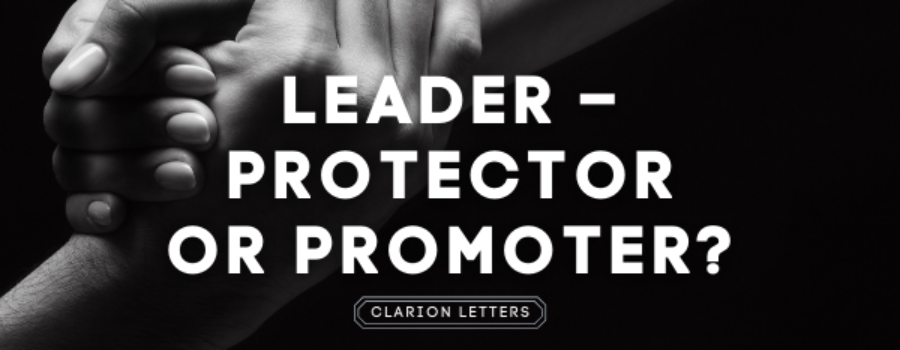Leader – Protector or Promoter?
(4 min read – 639 words)
Four qualities to be on guard against
Promotion is not merely a title or position change. It entails seeking to progress, support, or actively grow team members. The spirit of promotion is a passion to cultivate others into their fullest potentials – even if doing so means losing them.
To withhold promotion to protect oneself or position is a real problem amongst organizations today.
If a mother withheld milk from her baby, we would call that neglect. If a leader withholds from those in their care, we call that selfishness. Selfishness and self-protection are the very opposite of leadership. It is rooted in fear – fear of image loss, fear of replacement, fear of debasement, or fear of advancement.
Below are four qualities of protectors to be on guard against. Protectors:
1. Suppress not share– Protectors deliberately suppress and withhold organizational knowledge from others. The CTO who withholds expertise from their staff, or the operator lead who forces a trainee to just “figure it out for themselves” both have protector mindsets. They are preserving their own kingdoms at the expense of the greater good. Failing to share means failing to promote not only the person, but also the function and organization at large.
2. Push not pull – Protectors push while promotors pull. Pushing people means using commandments and consequences to drive action. To pull people means drawing action out of them using rewards. Doing this requires inspiration, questioning, and a clear understanding of their motivations. For example, pushing says, “Susie, you better finish this project by 5pm Friday. If not, you will lose all credibility with our client.” Pulling says, “are you going to finish the project this week as agreed? This will be a major business milestone. The benefits will be XYZ to you and the company.”
Both pushing and pulling are valuable at various times. The difference is that protectors are constantly pulling out the push card, rather than pulling the best out of their people.
3. Coercive not cohesive – Protectors coerce. Promotors unify. Leaders do not lead teams. Teams do. The leader’s role is to ask questions so the team can make cohesive decisions together. This is servant leadership versus top-down leadership. But let us not throw the baby out with the bathwater. Top-down leadership does indeed help in unique times of crisis or confusion. I mean, if all the kids in the backseat are yelling and strangling each other, there is a real need for an authoritative and directive voice. But, if they are in the backseat brainstorming Mother’s Day gifts for mom, then that same voice should be a promoter of cohesive questioning instead. “What do you think mom wants? What is her favorite flower?”
In times of continuous improvement, it is always the voice of the promoter that succeeds.
4. Criticize not construct – Criticism is offering truth in judgment. Being constructive offers truth in grace by extending a hand to help the other align with it. For example, criticism says, “Bob, you did not meet the numbers last week. You need to do better. If you do not, it is going to ruin your career with our company.” Constructivism digs to understand why. It says, “Bob, you did not meet the numbers last week. Help me understand why. Oh, and before you leave for the day, here are extra resources and contacts that may help you achieve it next week.” These scenarios are vastly different.
In truth, there is likely some protector in all of us. To change requires regular reflection on our values, actions, and motivations.
We should ask ourselves, “Which of these qualities should I personally work on so I can be the best leader to my people?”
What has been your experience with protectors and promotors – good or bad? Comment or write back. I would love to hear about it.








